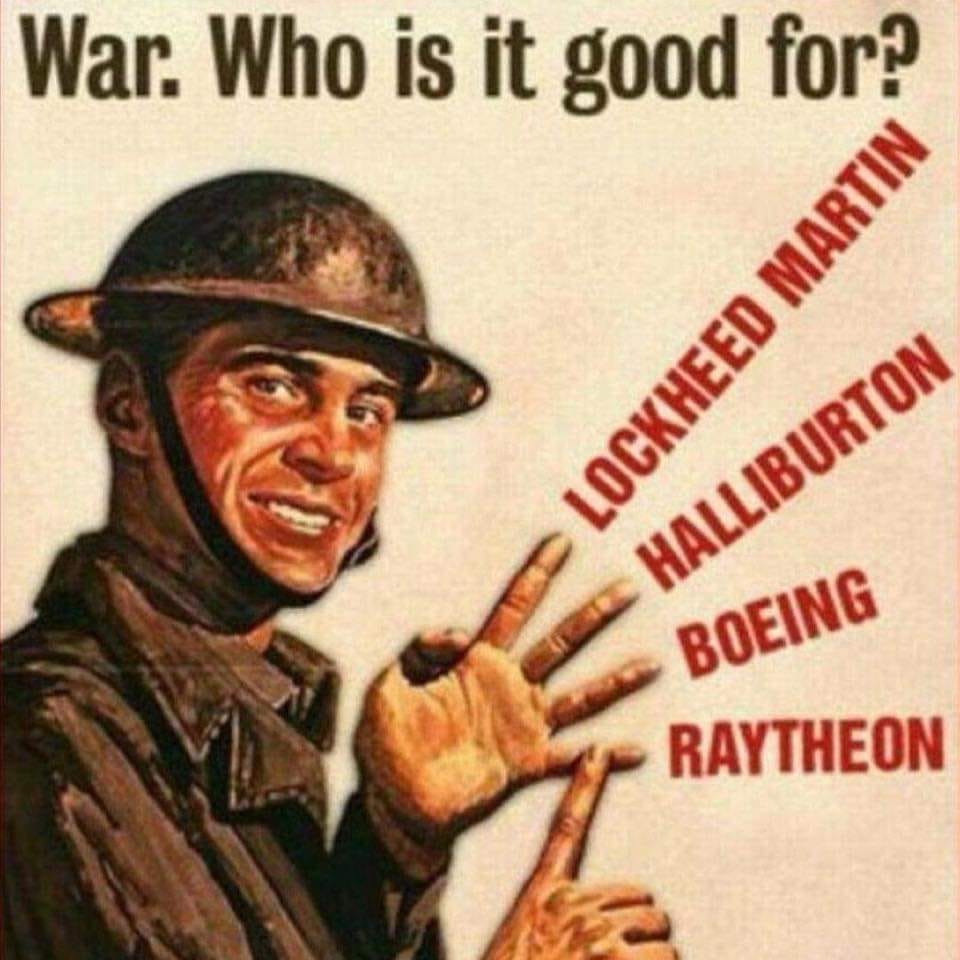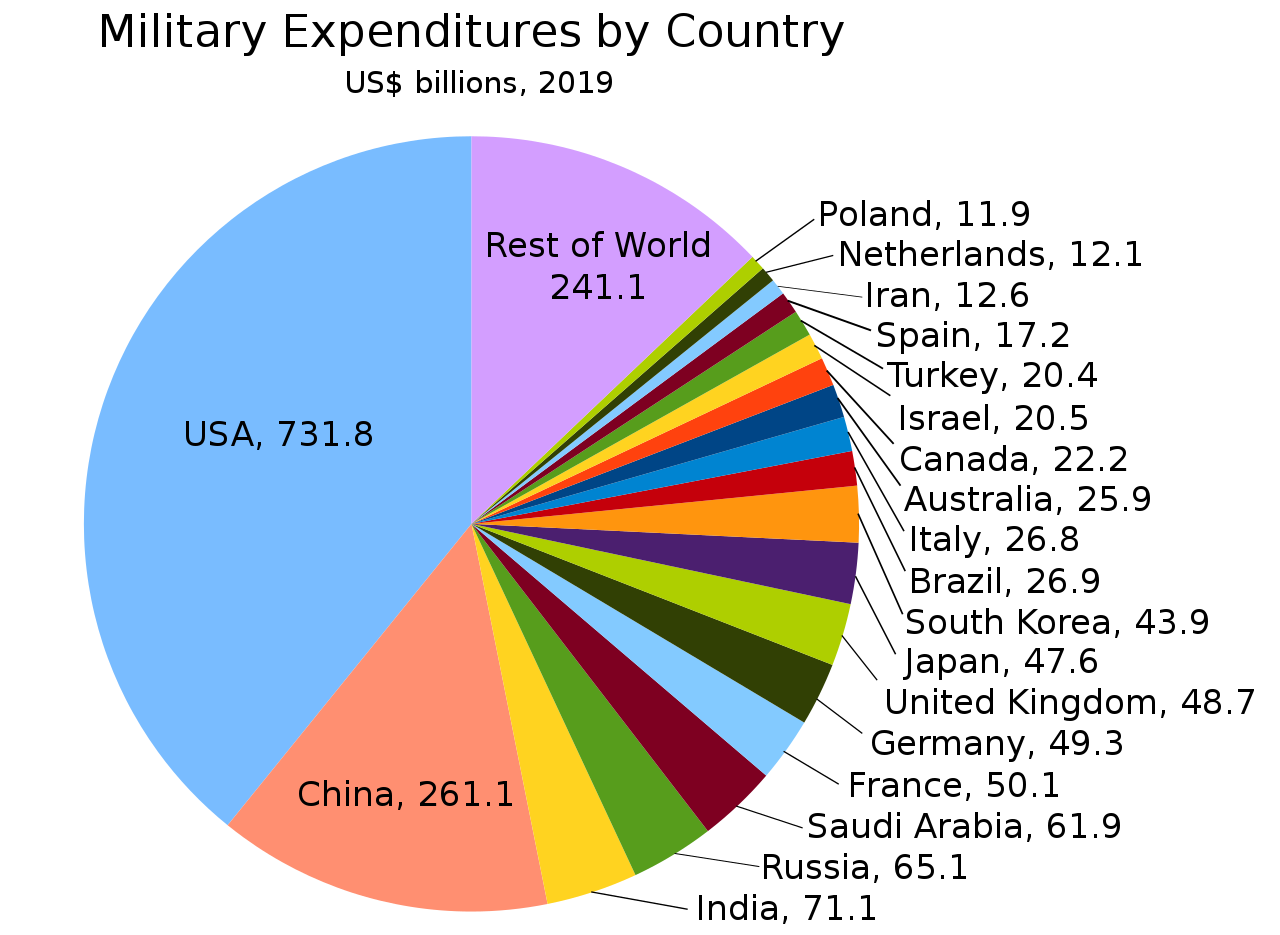“Until the latest of our world conflicts, the United States had no armaments industry. American makers of plowshares could, with time and as required, make swords as well. But we can no longer risk emergency improvisation of national defense. We have been compelled to create a permanent armaments industry of vast proportions. Added to this, three and a half million men and women are directly engaged in the defense establishment. We annually spend on military security alone more than the net income of all United States corporations.
Now this conjunction of an immense military establishment and a large arms industry is new in the American experience. The total influence—economic, political, even spiritual—is felt in every city, every Statehouse, every office of the Federal government. We recognize the imperative need for this development. Yet, we must not fail to comprehend its grave implications. Our toil, resources, and livelihood are all involved. So is the very structure of our society.
In the councils of government, we must guard against the acquisition of unwarranted influence, whether sought or unsought, by the military-industrial complex. The potential for the disastrous rise of misplaced power exists and will persist. We must never let the weight of this combination endanger our liberties or democratic processes. We should take nothing for granted. Only an alert and knowledgeable citizenry can compel the proper meshing of the huge industrial and military machinery of defense with our peaceful methods and goals, so that security and liberty may prosper together.”1
President of the United States of America Dwight Eisenhower.
When Eisenhower delivered this address on the Military Industrial Complex (MIC) he knew his way around war. The one-time General had commanded the combined Allied armies of the Western Front in World War II and had been the President during the end of the Korean War and the start of the American involvement in the Vietnam War.
His address was a warning to the American public of the dangers of the MIC. By his obvious concern, it was clearly a battle he had not won.
The President after him was shot dead in Dallas.
According to Merriam-Webster, the MIC is: an informal alliance of the military and related government departments with defense industries that is held to influence government policy.2
When a nation such as the United States falls under the influence of the MIC, the nation develops a socio-economic addiction to the production of war material. Modern war machines aren’t the wool jackets and infinitely storable bolt-action rifles of yesteryear, but complex, constantly adapting, highly technical devices.
Capitalism sure breeds innovation doesn’t it?
These need to be updated constantly, tweaked, tested and of course, expended, otherwise one would have to cease production and close a very profitable and expensive factory. One that employs tens of thousands of workers in every high-tech field imaginable.
Robots designed to kill people are very complex.
In order to justify the production of said material, war is necessary. Entire media ecosystems exist to sustain this. There is not a war on Earth that the US media wouldn’t gleefully support. Just ask Brian Williams of MSNBC commenting on US strikes in Syria3.
“We see these beautiful pictures at night from the decks of these two US Navy vessels in the Eastern Mediterranean. I am tempted to quote the great Leonard Cohen, “I am guided by the beauty of our weapons” and they are beautiful pictures of fearsome armaments…”
If media commentators salivating about dead Syrians isn’t enough, there are always the 'talking heads’ on mainstream media channels to hype up our bloodlust. CNN has retired Lt. General Mark Hertling and James “Spider” Marks to tell the world about how much American winning is occurring and how barbaric the Empire’s enemies are. CBC frequently has on the ever bellicose retired General Rick Hillier
Just in case we aren’t feeling like watching TV, the MIC will advertise to us. Throughout this are pictures from the Ottawa Airport, advertisements for military hardware. War lobbying is bad enough, but these companies have advertising wings.
These campaigns together place war in the consciousness of the citizens of Empire. It’s always on the tip of the tongue, it’s always a final solution to crisis. War is a product in the same way that food is under Capitalism. The objective is to profit by the production of, not produce for the required consumption.
It is this ecosystem that Trump barged into. For all his innumerable and contemptable sins, excessive war mongering actually wasn’t one.
He tried to negotiate some kind of peace or détente with the DPRK and the Taliban, he didn’t start any new wars, and the military adventurism he did do such as the assassination of Qasem Soleimani, one can at least say it was on a small scale.
The disaster that was the withdrawal from Afghanistan can be laid partially at his feet for the precipitous withdrawal he initiated, but this was, when Biden took office, not yet irreversible. Not addressing the shortcomings of that withdrawal plan was as much a choice as initiating it, especially given the warnings being issued at the time.4
Discussing General Mark Milley, Trump was caught in 2021 on tape telling an associate “He said that I wanted to attack Iran, Isn’t it amazing? I have a big pile of papers, this thing just came up. Look. This was him. They presented me this – this is off the record but – they presented me this. This was him. This was the Defense Department and him.”5
What Trump is referring to in this recording is a strike plan that was given to him outlining how he could attack Iran. It was alleged during the end point of his presidency that the US Military was worried he would attack Iran.
We know Trump has a track record of lying, that is clear, but examine this issue. The Pentagon says Trump could launch an attack on Iran as a lame-duck President, then, as Trump alleges6, they encourage him to do so by, at the very least, outlining how they could do so. He also knew enough to see what was afoot and kept the document.
The toxic relationship the US Government has with war is known, Eisenhower wasn’t the first General to blow the whistle on it either.7 This needs, but will not receive, proper scrutiny. It is an issue that transcends one POTUS or another. It’s much larger and much more insidious than is up for discussion and the mainstream media is doing it’s job by not bothering to report it.
There is not an anti-war party in the United States or Canada represented in the halls of power.
These are not unrelated observations.













I send these posts far and wide because they contain FACTS that people need to have front and centre in their minds.
I feel like a lot of our issues, in Canada at least, could be fixed by axing FPTP.
Right now a lot of people feel pigeonholed into 'preventing the other guy from taking power' which is a ridiculous thing to have to worry about. If we had proportional representation, we would see a lot of independents popping up.